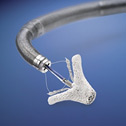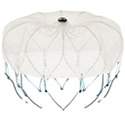When artificial valves replace damaged heart valves, they can sometimes develop a leak (regurgitation or blood backing up into the pumping heart chamber). The most common cause of paravalvular leaks is an infection, but other factors such as the amount of calcium around the valve can also cause leaks. While small leaks may cause no symptoms, larger leaks can cause congestive heart failure, hemolysis, and a higher risk for future infections.
Inova’s specially trained interventional cardiologists perform transcatheter (minimally invasive/nonsurgical) PLV repair by inserting a catheter into a blood vessel in the groin area, advancing it through the blood vessels to the site of the leaking heart valve, and implementing one or more specialized closure devices to plug the leak.
Symptoms of Paravalvular Leak (PVL)/Valve Regurgitation
PVL symptoms may include shortness of breath, fatigue, a heart murmur, rapid or fluttering heartbeat, or swelling in the feet or ankles. Even if no symptoms are present, repair may prevent PLV from getting worse or relieve the workload on your heart.


 The WATCHMAN FLX™ left atrial appendage closure procedure offers stroke risk reduction in nonvalvular atrial fibrillation (AFib) patients who are not candidates for chronic anticoagulation medications (i.e., blood thinners) due to noncompliance, occupational restrictions, long-term bleeding or a strong preference not to take anticoagulants. Patients can be discharged home after placement of the device, which occurs in Inova's interventional lab, followed by an overnight stay. Most patients can permanently discontinue anticoagulation medications after 45 days.
The WATCHMAN FLX™ left atrial appendage closure procedure offers stroke risk reduction in nonvalvular atrial fibrillation (AFib) patients who are not candidates for chronic anticoagulation medications (i.e., blood thinners) due to noncompliance, occupational restrictions, long-term bleeding or a strong preference not to take anticoagulants. Patients can be discharged home after placement of the device, which occurs in Inova's interventional lab, followed by an overnight stay. Most patients can permanently discontinue anticoagulation medications after 45 days.